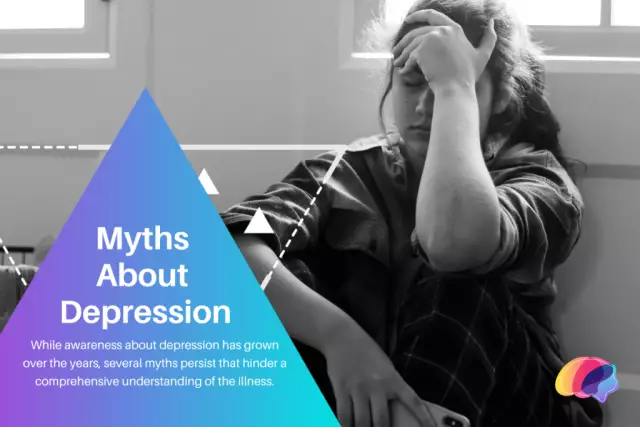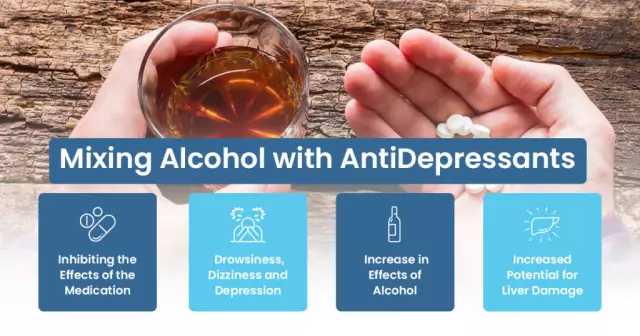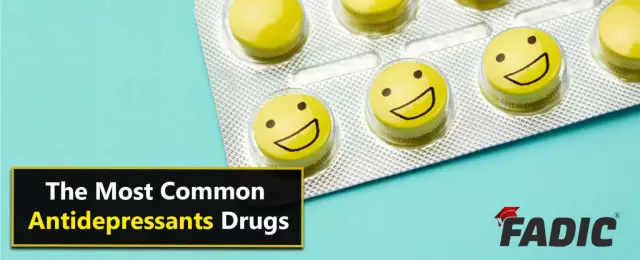- Author Rachel Wainwright wainwright@abchealthonline.com.
- Public 2023-12-15 07:39.
- Last modified 2025-11-02 20:14.
10 myths about depression and antidepressants
It happens that depression becomes the engine of success.

For example, lyrical depression, during which Goethe and Pushkin worked. Or dysphoria (angry depression with sudden mood swings), in which a person seeks to prove to everyone around what he is capable of.
What is depression?
Depression is a mood when a person feels despair, inadequacy. This mood is characterized by a decline in activity and performance, sadness and pessimism.
In our country, very little is known about depression, and the existing ideas about it are rather distorted. In fact, everything we know about depression can be categorized as a myth. Here are the most common ones:
Myth 1: autumn depression is the lot of whiners
If we conditionally divide people into those prone to depression and not prone to depression, then about 5-7% of people from all over the world will fall into the second category. In psychiatry, these people are called "sunny natures." Unfortunately, everyone else has a blues at least once in their lives. Who feels psychologically uncomfortable in the fall?
- People with weak vegetation. In the first place they have pressure surges and attacks of dystonia, as a result of which a depressive mood arises. This category includes about 15% of people.
- Cyclothymic personalities. These are ordinary healthy people who, however, are prone to frequent mood swings. Such people are called too sensitive. In the fall, these people feel a sharp decline in strength, everything falls out of their hands, headaches, tears and irritability appear. There are about 20% of such people.
- There is another special group of people to whom autumn depression often comes - hormone-dependent. This category includes, for example, pregnant women or women experiencing menopause, as well as people with thyroid disease.
Myth 2: the impetus for depression is always experienced stress or shock
In fact, a lot depends on the psychotype of a person. It happens that the experienced stress introduces a person into a state of post-traumatic depression. However, it often happens that just a shock can cause a person to come out of a depression.
Most often, depression is the result of the accumulation of negative emotions. Sometimes, in order to identify the cause of the disease, it is necessary to "rewind" the patient's life several years ago.
Stress manifests itself in different ways. For some, it translates into purely psychological manifestations - the appearance of phobias, overt depression. And in other people, the stress experienced provokes diseases of the internal organs. Psychiatrists call this phenomenon somatized or masked depression.
In choleric people, stress most often provokes diseases of the cardiovascular system (heart attack, coronary artery disease, hypertension), as well as urological problems and duodenal ulcer.
Melancholic people, after experiencing stress, run the risk of developing stomach ulcers, neurodermatitis, and asthma conditions.
But phlegmatic and sanguine people are less prone to diseases on a nervous basis.
Myth 3: depression is not a disease and does not need treatment
In fact, depression is a rather serious disease, the main danger of which is an increased tendency to suicide. Undoubtedly, a person can cope with mild depression on their own, but in severe cases, it can last for years, constantly intensifying and developing into a more severe form, for example, into manic-depressive psychosis.
Myth 4: depression is for life
This statement is fundamentally wrong. A person needs adequate treatment, during which he can forever forget what depression is.
If the depression is mild, then to overcome it, it will be enough just to shake it up. But if you have the following signs, then you should immediately see a doctor:
- Frustration and bad mood, inability to concentrate for more than one week;
- In the morning you wake up with bad thoughts and feelings of longing;
- A depressive state occurs against the background of general well-being, that is, it does not correspond at all to the environment;
- Sleep is disturbed - you stop sleeping well at night, or, on the contrary, start sleeping a lot during the day;
- You have obsessive suicidal thoughts.
Myth 5: if you just ask for help, they will feed you antidepressants
An integrated approach is very important in the treatment of depression: psychotherapy and medications. Moreover, there is no universal treatment regimen. Asthenic depressions will be treated with stimulants, and for anxiety depressions, sedatives will be prescribed. In any case, everything is individual and depends on the patient's condition.
Myth 6: antidepressants are dangerous to health
Actually, there is some truth in this statement. Antidepressants, even modern ones, have a fairly impressive number of side effects, although professional specialists try to find the exact dosage for their patients: help as much as possible and minimize harm.
Most commonly, antidepressants cause dizziness and headaches, photophobia, palpitations, sweating, decreased libido, and loss or increased appetite.
In any case, you must remember: depression can last for years, constantly getting worse, and side effects will disappear immediately after the drug is discontinued.
Myth 7: antidepressants are addictive
Antidepressants are never physically addictive. The only thing is that psychological dependence can arise, but it can also arise from ascorbic acid. One has only to look at the children, who are always asked to buy "big tasty pills" at the pharmacy. The most real psychological addiction!

Myth 8: why do I need a doctor, I myself can prescribe antidepressants to myself
After such a reception, a wide variety of consequences should be expected. The chance that these drugs, chosen at random, will help - is minimal. Antidepressants, and especially their dosages, the doctor selects strictly individually.
Myth 9: antidepressants can be stopped at any time
While taking antidepressants, the patient should be under strict medical supervision. In no case should the patient quit drinking medications on his own, explaining this by the fact that it became easier for him.
Myth 10: depression is just a lack of positive attitudes
Here are the most common types of depression that manifest themselves in different ways:
- Anxious - a person feels unreasonable anxiety and general anxiety.
- Angry - everything annoys and angers a person.
- Asthenic - depression of exhaustion. A person always feels tired.
- Grumbling - a person constantly complains and whines, is unhappy with everything.
- Apathetic - complete indifference to the outside world.
- Masked - manifests itself in the form of diseases of the internal organs.
- Smiling - outwardly a person is benevolent, but under this mask lies mental pain, melancholy and indifference.
- Anhedonic - satiety with emotions, inability to feel joy.
- Depression without depression - dissatisfaction with oneself and the whole world, blues, inability to define one's desires.
Found a mistake in the text? Select it and press Ctrl + Enter.






